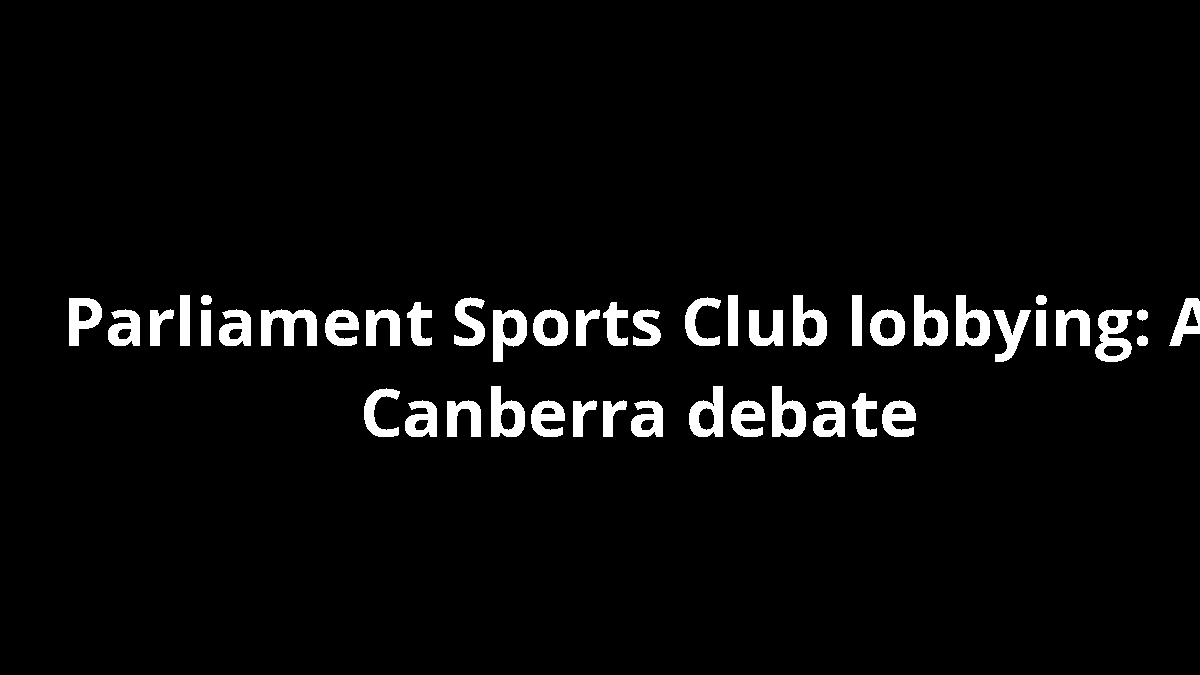Australian Parliament Sports Club lobbying: definitional debates
What counts as lobbying: definitional debates
Parliament Sports Club lobbying has become a focal point in Canberra’s political discourse. The phrase Parliament Sports Club lobbying is used by critics to question how clubs operating near Parliament House shape decisions, while supporters argue it’s routine networking with sports and social events. Parliament Sports Club lobbying discussions spotlight what counts as influence, who can lobby, and how transparency should work in semi-official settings. When journalists compare Crikey’s reports and parliamentary rules, Parliament Sports Club lobbying emerges as a single, recurring label for a spectrum of activities that touch governance, funding, and access.
At heart, the definitional debate tests where lines are drawn between traditional member services and advocacy. Critics contend that even casual meetups, sponsorships, or gift exchanges can shape policy if they occur near decision-making. Proponents insist that sports clubs foster collegial relationships and do not equate to lobbying per law or ethics guidelines. The ongoing dialogue shows Parliament Sports Club lobbying is not a single act, but a range of behaviors that require clear governance and disclosure.
What counts as lobbying at Parliament House?
Legal frameworks and ethics standards
Observers ask how Parliament House defines lobbying in practice. The ethics standards for public office emphasize transparency and disclosure when access to decision-makers occurs for advocacy or sponsorship. In Canberra, the boundaries depend on intent and context, and many activities fall into a gray area. When a club hosts events, secures funding, or arranges meetings at Parliament House, questions arise about whether this constitutes lobbying or permissible social engagement. For guidance, World Rugby governance guidelines provide a framework for when relationships between sport bodies and government cross into lobbying, and World Rugby governance guidelines help clarify expectations. Meanwhile, coverage from BBC Sport Rugby underscores the need for robust ethical rules in sport-adjacent activities.
In practice, many figures in Parliament House argue that transparency needs to be practical, not merely procedural. The key is distinguishing routine social interaction from targeted advocacy aimed at securing favorable outcomes. Transparency portals, disclosure forms, and periodic ethics reviews can reduce ambiguity. However, the line remains nuanced because a simple invitation can become leverage in a tight political environment. For readers, the takeaway is that governance around such clubs must be proportionate and consistently applied to maintain trust.
Daanyal Saeed’s deep dive into the Parliament Sports Club saga
Timeline and key players
Daanyal Saeed, Crikey’s media reporter, has outlined a timeline that traces activity from early funding arrangements to ensuing scrutiny. The saga centers on how funds flow, who approves expenditures, and where oversight resides. Saeed’s analysis emphasizes that lobbying is a spectrum, not a single act, and that different activities may or may not fall within parliamentary rules depending on context, intent, and governance structures. The timeline highlights key players who shaped the public narrative, including club administrators, MPs, and lobbyists whose interactions blurred the line between sport and influence.
The deep dive also shows how media framing can influence perceptions of legitimacy. Saeed’s narrative helps readers understand that transparency mechanisms, editors’ inquiries, and ethics briefings all contribute to the evolving picture. For rugby followers, the case reads like an ethics primer: how much access is appropriate, and what safeguards prevent conflicts of interest when sport interacts with politics. The podcast edition of the piece adds dimension by offering voices from insiders and critics alike, giving a balanced sense of where the boundaries lie.
Funding, governance, and transparency in parliamentary sports clubs
Funding sources and governance gaps
Funding for parliamentary sports clubs often sits at a crossroads between official budgets, sponsorship, and private donations. The debate centers on whether public funds should support social sports or only officially sanctioned activities. Governance gaps can arise when there is limited public visibility into how money is allocated, who approves disbursements, and how conflicts of interest are managed. In this context, the phrase Parliament Sports Club lobbying recurs as critics seek clarity on whether funding arrangements amount to indirect influence or simply enable healthy recreational life for staff and members. The overall goal is to ensure that governance structures align with parliamentary ethics and public expectations.
To supplement governance, some clubs publish annual reports and meeting minutes, while others rely on ad hoc disclosures. A practical approach includes a mix of budgets, sponsorship disclosures, and independent audits. When governance is robust, it helps prevent perceptions of undue influence and protects the integrity of both sport and politics. For readers, the central message is that transparency fosters trust, especially in spaces where public service and private interests converge. The idea is to create a clear, auditable trail for all funding-related decisions.
- Public funding transparency
- Sponsorship disclosures
- Governance oversight
- Conflicts of interest management
Crikey’s analysis: unpacking the Parliament Sports Club lobbying furore
Media framing and public accountability
Crikey’s analysis situates the Parliament Sports Club lobbying furore within broader debates about accountability in public life. The piece argues that lobbying isn’t a binary category; it includes paid advocacy, access requests, sponsorships, and informal influence. The reporting suggests that different activities may be permissible under parliamentary rules depending on governance and intent. This nuanced view helps readers understand how media framing can shape policy discussions and highlight areas where ethics frameworks may need strengthening. The piece also points to the need for consistent rules across similar clubs in other jurisdictions to avoid a patchwork system that can obscure accountability.
As the saga unfolds, the media role remains crucial. Journalists serve as a check on power by asking where money moves, who benefits, and what safeguards exist to protect the public interest. The Crikey analysis complements official disclosures by providing context and timelines, offering readers a more complete map of the grey areas. For rugby fans, the takeaway is that governance should be as open as possible when sport intersects with government, ensuring that the love of the game does not collide with the duties of public service.
Auditing and accountability in parliamentary sport clubs
Best practices and recommendations
Best practices begin with clear charters that define permissible activities, a transparent budgeting process, and regular external audits. Auditing should examine funding sources, inside deals, and usage of facilities near Parliament House to ensure there is no preferential treatment or hidden influence. Additionally, clubs can implement a strict conflicts-of-interest policy with regular training for members and staff. Public-facing dashboards showing donations, sponsorships, and expenses help foster trust among stakeholders and rugby supporters alike.
Recommendations for governance include appointing an independent oversight committee, publishing annual ethics reviews, and establishing a whistleblower channel for concerns about improper influence. By embracing these practices, Parliament Sports Club lobbying concerns can be reframed as opportunities to demonstrate accountability and professionalism. The result is a healthier balance between sport’s social value and the integrity required for public institutions. As rugby communities watch Canberra, the model could inform best practices for other parliamentary or government-linked sport bodies.


